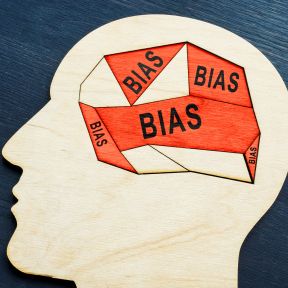
Halo Effect
The halo effect is a cognitive bias that occurs when an initial positive judgment about a person unconsciously colors the perception of the individual as a whole.
When forming a first impression, observing an initial attractive feature—perhaps beauty or strength—can make the person appealing, making it difficult to revise that impression based on new or opposing information. For example, an attractive individual may also be perceived as interesting, ambitious, or funny, whether or not that assessment is warranted.

The mind mines the world for information to confirm preexisting beliefs. People strive to avoid the difficulty of reconciling conflicting information and hope to feel confident in their initial judgments. Human beings are complex; the halo effect may be an effective shortcut to understand another person until the relationship progresses.
A manager might appreciate an employee’s enthusiasm so much that they inadvertently write a glowing, yet unmerited, performance review. A consumer’s love for a certain product may prompt them to choose the item with the same brand name when faced with two options. The halo effect can take hold in many domains.
Start by being confident, because people notice if you are positive about yourself. Giving an initial good impression through a tidy and organized appearance can help. Of course, show enthusiasm for life in general.
Research shows that dieters significantly underestimate the calories in food when it is labeled as healthy or organic. Dieters also perceive it as being more appropriate to eat every day, even if it is obviously an indulgence. In one study, the "health halo" was bestowed on organic Oreo cookies.
The term was coined by psychologist Edwin Thorndike in 1920. Thorndike asked commanding officers to rate soldiers on physical characteristics such as physique, and to rate personality traits such as intellect, leadership, and loyalty. He discovered unexpectedly strong correlations between superior physical characteristics and superior personality traits.

It may be helpful to recognize and counteract the halo effect in potentially problematic situations. One can try to slow his or her reasoning process and focus on the trait in question. Concrete action can also be helpful: Professors can grade papers anonymously, for instance, to prevent prior information from influencing a student’s grades.
This effect distorts the way you may see a person or a product, thinking that the person or item is better and more amazing than reality dictates. We are more inclined to gloss over an attractive person’s negative attributes, such as selfishness, and judge them more positively than merited.
As one might expect, forming long-term relationships diffuses the halo effect. This allows a person new and varied information to create a deeper, nuanced, and more accurate portrait of the person.
When an initial perception creates a negative aura around a person or product, the halo effect may be referred to as the “horns effect,” the “reverse halo effect,” or the “devil horns effect.” An initial negative characteristic during a first impression can spur negativity bias, where the impact of any negatives has a greater impact.














